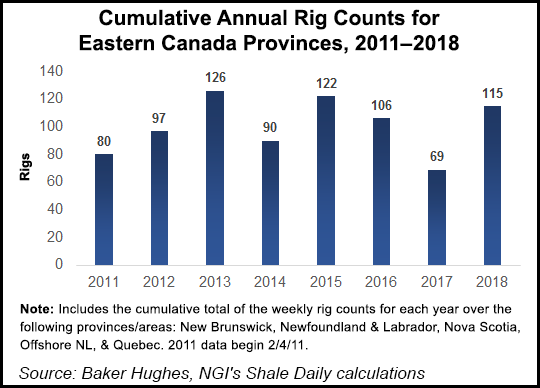Shale Daily | Infrastructure | NGI All News Access | NGI The Weekly Gas Market Report
Political Party Challenges Canada’s Equalization Scheme
A rebel wing of the Canadian political right has set out to forge an industrial missing link aimed at breaking through environmental disdain that blocks hydraulic fracturing (fracking) and pipeline construction in the eastern half of the country — financial motivation.

The four-month-old People’s Party of Canada is shaking a national pillar by challenging a government income redistribution scheme — “equalization” — that supports comparable public services in all provinces regardless of their economic stature.
During a televised panel discussion in Quebec, the fledgling party’s founder, Maxime Bernier, christened its policy “smart populism.” The core idea is to make provinces participate in resource development by curtailing handouts from the federal government.
Although Bernier is a Member of Parliament from Quebec, his approach strikes popular chords in natural gas and oil producing Alberta, Saskatchewan and British Columbia, which are net contributors to equalization.
He told the TV audience, “We need to change the [equalization] formula to create incentives so that other provinces develop public policies that create wealth.”
The formula makes annual calculations of all the Canadian provinces’ unaided tax revenues per capita. Jurisdictions that fall below the national average are topped up by payments drawn from the federal treasury.
No strings are attached to the grants. The receiving provinces are allowed to use the money for satisfying varying public service desires of their populations.
Federal Finance Minister Bill Morneau recently announced 2019-2020 fiscal year equalization payments of C$19.8 billion ($14.8 billion). The total includes C$13.1 billion ($9.8 billion) for Quebec, C$2.2 billion ($1.6 billion) for Manitoba, C$2 billion ($1.5 billion) each for Nova Scotia and New Brunswick, and C$419 million ($314 million) for Prince Edward Island.
Quebec, Nova Scotia and New Brunswick have enacted popular bans against fracking to tap well-known, large shale gas resources. A new Conservative government in New Brunswick is reconsidering the prohibition, which was imposed by the former Liberal administration, but only for communities that show strong interest in developing production.
The Quebec government also successfully fought the western energy industry’s drive to increase sales and prices with the defunct Energy East proposal for partial conversion of TransCanada Corp.’s gas Mainline to oil service plus an extension to the Atlantic coast.
Although the People’s Party of Canada platform and vocabulary prompt comparisons to Donald Trump, founder Bernier has a different background from the United States president.
Bernier, a prominent lawyer and banker, won four consecutive elections to Parliament and was a minister in the former Conservative cabinet before the current Liberal regime won the 2015 federal election. He narrowly missed winning the resulting 2017 Conservative leadership election as the runner-up with 49% of the party vote.
He is not alone in seeking an overhaul of the equalization program in the name of encouraging economic development. A parallel campaign is under way by the top opposition contender to become Alberta premier in the forthcoming spring provincial election: United Conservative Party leader Jason Kenney, who is also a former federal Conservative cabinet minister.
For Bernier and Kenney alike, election victories would only start national struggles to change the equalization program. A war of words is already heating up between the contributor and receiver jurisdictions, known as “have” and “have-not” provinces.
The scheme has the stature of a civil right across Canada.
The national constitution says, “Parliament and the government of Canada are committed to the principle of making equalization payments to ensure that provincial governments have sufficient revenues to provide reasonably comparable levels of public services at reasonably comparable levels of taxation.”
© 2024 Natural Gas Intelligence. All rights reserved.
ISSN © 2577-9877 | ISSN © 1532-1266 | ISSN © 2158-8023 |
